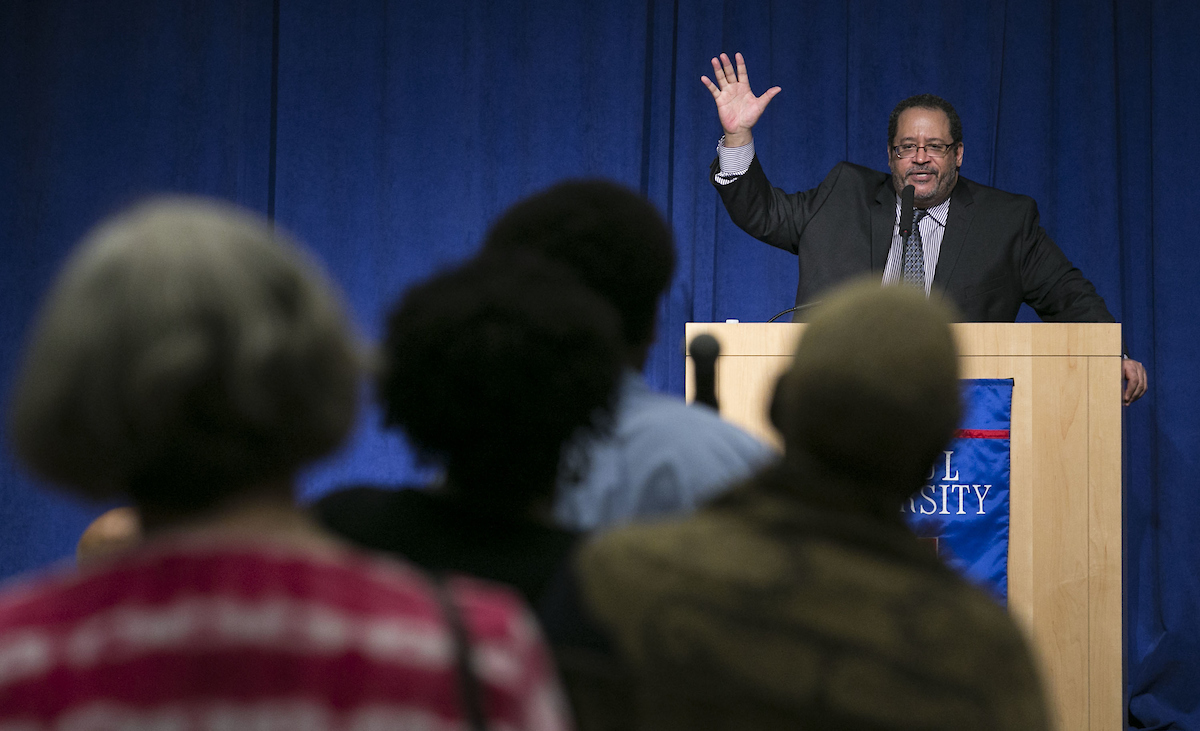 Michael Eric Dyson fields questions from the audience after the inaugural presentation at the Speakers Series on Race and Free Speech Monday, Sept. 19, 2016 at DePaul University's Lincoln Park Campus. (DePaul University/Jamie Moncrief)At Convocation in September, the Rev. Dennis H. Holtschneider, C.M., president of DePaul, unveiled a Speech and Race Action Plan to pursue throughout the 2016-17 academic year. From hosting discussion forums to professional development seminars, the DePaul community made progress on multiple aspects of the action plan in the fall quarter. Work continues this winter quarter.
Michael Eric Dyson fields questions from the audience after the inaugural presentation at the Speakers Series on Race and Free Speech Monday, Sept. 19, 2016 at DePaul University's Lincoln Park Campus. (DePaul University/Jamie Moncrief)At Convocation in September, the Rev. Dennis H. Holtschneider, C.M., president of DePaul, unveiled a Speech and Race Action Plan to pursue throughout the 2016-17 academic year. From hosting discussion forums to professional development seminars, the DePaul community made progress on multiple aspects of the action plan in the fall quarter. Work continues this winter quarter."We are trying to create a dialogue around diversity and civil discourse on our campus," says Liz Ortiz, vice president of the Office of Institutional Diversity and Equity. "In the fall quarter, we introduced a number of ways for our community to participate in these activities."
Creating communication mechanisms for students, faculty and staff to deliver feedback is a priority, Ortiz explains. Throughout the fall, multiple listening sessions took place, including brown bag lunches hosted by the Office of Institutional Diversity and Equity and round table discussions hosted by Student Government Association.
The university also conducted a student climate survey on diversity. Results will be shared this quarter.
Academic Affairs and Student Affairs introduced new resources for faculty and students. Student Affairs hired an additional psychologist in University Counseling Services to offer a broader range of support, especially to help students of color process issues related to race, speech and campus climate. Provost Marten denBoer appointed Lawrence Hamer to lead diversity initiatives in the Office of Academic Affairs, including curriculum and program development, as well as faculty hiring and retention.
In addition, OIDE delivered multiple professional development seminars on faculty searches and implicit bias.
"Incorporating professional development opportunities that focus on bias will help raise awareness at the university and support inclusion," Ortiz says.
The university appointed two task forces to address issues related to speech and expression and student organization speaker requests. Both have begun their work and intend to finish in this academic year. Faculty Council, Staff Council and the Student Government Association are in the process of providing feedback on the recommendations drafted by the Student Organization Speaker Task Force.
"We are hopeful to implement the recommendations soon," says Gene Zdziarski, vice president of Student Affairs.
In the fall, multiple schools and colleges organized student events to support an ongoing dialogue about race and free speech. The Theatre School hosted an all-day diversity forum, giving students the opportunity to share experiences and gain advice from theatre professionals regarding racism both on and off the stage. The Department of Writing, Rhetoric and Discourse in the College of Liberal Arts and Social Sciences invited a cross-cultural communication expert to lead a discussion on language. DePaul's Center for Journalism Integrity and Excellence in the College of Communication welcomed Martha Minow, Harvard Law School dean, to speak about the role of journalists and free speech. The College of Law hosted four nationally recognized experts for a panel discussion on free speech and expression.
The President's Speaker Series on Race and Free Speech invited students, faculty and staff to contribute to ongoing discussions about race and free speech throughout the fall quarter. A keynote speech delivered by Michael Eric Dyson in September kicked off events in the fall quarter. Each presentation aimed to discuss the complexity of issues in dialogue with the university community by offering perspectives across the political spectrum. On election eve in November, for example, political commentator Daniel Drezner hosted a discussion on what is at stake for conservatives. Question and answer sessions followed each lecture, generating discussions among students, faculty and students. The President's Series on Race and Free Speech continues this quarter starting with the Department of Writing, Rhetoric and Discourse hosting North Carolina State University's Victoria J. Gallagher on Feb. 10 for a discussion on creating digital spaces to explore rhetoric and civil transformation. Later in February, the American Library Association's James LaRue will speak on the Lincoln Park Campus about censorship, silence and the First Amendment.
FALL 2016 STUDENT DIVERSITY
Fall enrollment achieved multiple diversity records:
- 8,316 students / 36 percent - largest number and proportion of students of color
- 3,501 students / 15 percent - largest number and proportion of Hispanic students
- 933 students / 38 percent - largest number and proportion of freshmen students of color
- 6,022 students / 39 percent - largest proportion of undergraduate students of color
- 2,075 students / 30 percent - largest number and proportion of graduate students of color